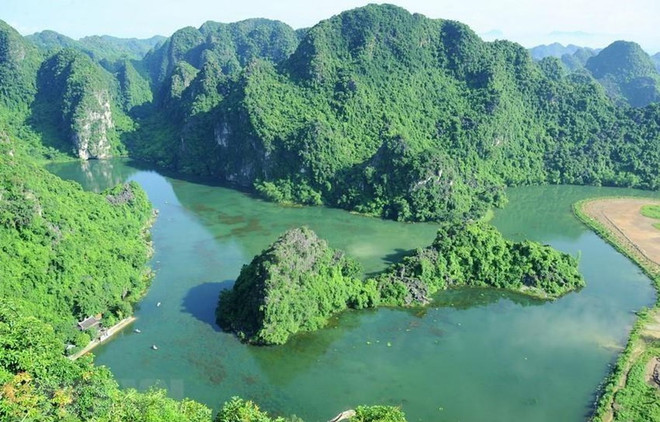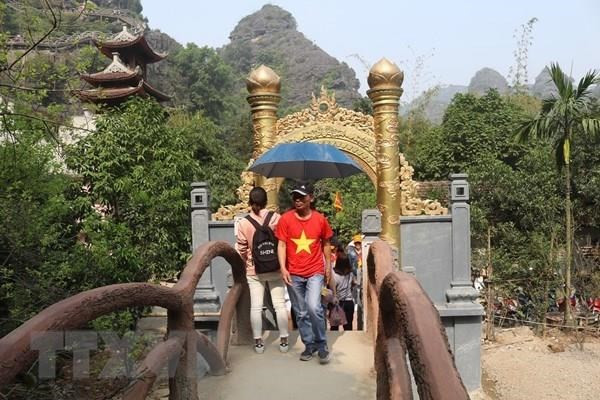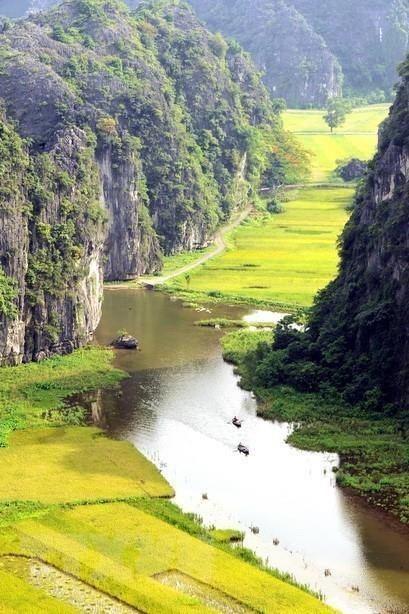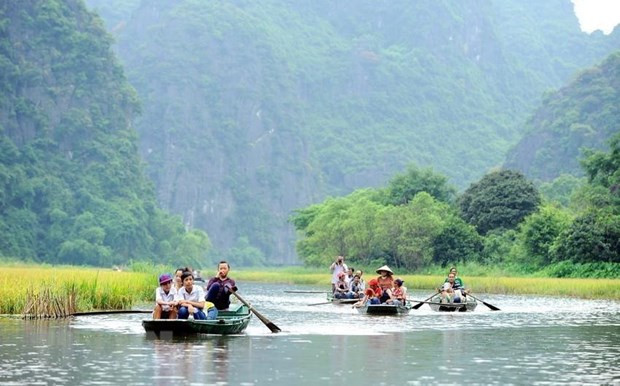 Dubbed the “Ha Long Bay on land” with nearly 100 spectacular caves, the Trang An Landscape Complex is the first mixed heritage of Vietnam that was recognised by UNESCO for meeting both natural and cultural criteria (Photo: VNA)
Dubbed the “Ha Long Bay on land” with nearly 100 spectacular caves, the Trang An Landscape Complex is the first mixed heritage of Vietnam that was recognised by UNESCO for meeting both natural and cultural criteria (Photo: VNA)Hanoi (VNA) – Trang An Landscape Complex in the northern province of Ninh Binh has become more popular among tourists, evidenced by the rising number of visitors to the area, which also reflects the success of promoting the World Heritage Site’s value.
Practical efficiency
Since Trang An Landscape Complex was recognised as the World Cultural and Natural Heritage Site in 2014, Ninh Binh province has made great efforts to conserve and develop the site.
The site spans 20 communes and wards in five districts and cities of Ninh Binh, comprising the Hoa Lu Ancient Capital, the Trang An-Tam Coc-Bich Dong Scenic Landscape and the Hoa Lu Special-Use Forest, covering a total 12,252 hectares.
Being aware of the significance of the heritage, after receiving the title, the province has directed sectors to focus on managing and preserving the site in line with tourism and service development.
Nguyen Van Hoat, Chairman of the People’s Committee of Ninh Hai commune, Hoa Lu district, said the commune is home to many famous landscapes included in the Trang An complex, such as Tam Coc-Bich Dong, Thung Nang and Thung Nham.
Every year, tourism facilities in the commune attract more than 100,000 tourists. The development of tourism has brought positive changes in the communes and improved locals’ income.
Therefore, the government and residents in Ninh Hai have paid due attention to protecting the heritage as well as the natural landscape and environment in the site, he said.
Ninh Hai has focused on encouraging locals to maintain environmental sanitation and practice a cultured lifestyle.
Alongside, the commune has inspected tourism activities and handled violations which harm the historical and cultural relic sites, especially activities that damage the environment and natural landscapes in the heritage site.
The Trang An Landscape Complex’s core area has many residential areas. Thus, localities in the complex have been advised to apply strict measures in resident management.
Hoa Lu district has pioneered in the work with many effective and creative models.
Nguyen Thi Cuc, Vice Chairwoman of the People’s Committee of Hoa Lu said the committee has worked hard to realise legal regulations in heritage protection, ensuring harmony between the Government and the public as well as between businesses and citizens, especially in protecting the environment and ensuring security in the heritage site.
In the future, the district will continue communication work on the significance of the site and the benefits it brings, she said.
Thanks to good communications and promotion, the number of tourists visiting Ninh Binh has increased.
In 2018, the province welcomed 7.3 million visitors, 6.2 million of whom visited Trang An, double the figure in 2014.
Tourism activities have contributed to boosting socio-economic development in the locality, created jobs and improved incomes for locals, thus locals can “live in the heritage site, protect the site and benefit from the site”.
Challenges in protecting the heritage
As Trang An spans over 12,000 hectares crossing five district and cities with tough terrain, the inspection and detection of activities harming the heritage can be difficult.
Statistics from the Management Board of the Trang An Landscape Complex showed that currently, about 50,000 people are living in the heritage site. Preservation-development conflicts have been the leading challenge while financial resources and land stock have yet to meet demand for the resettlement of the residents who live in both core and buffer zones of the heritage, as well as for maintaining their traditional livelihood and creating new money-earning methods.
Meanwhile, the awareness of the importance and benefits from the heritage has remained modest among the Government and Party Committees of localities as well as officials and businesses, leading to poor management of investment, construction and natural resources in some localities.
 The building of concrete works damages the overall landscape of the core zone of the Trang An World Cultural and Natural Heritage (Photo: VNA)
The building of concrete works damages the overall landscape of the core zone of the Trang An World Cultural and Natural Heritage (Photo: VNA)Coordination among agencies, units and localities in managing, preserving and developing the value of the heritage has remained poor, resulting in slow and ineffective settlement of heritage harming cases.
Monitoring, inspecting and settling measures have yet to be coherent, leading to some serious cases such as the illegal construction of works in Cai Ha mountain and the operation of homestays in residential areas in the core zone of the heritage.
Strengthening State management
To better manage, conserve and promote the value of the heritage, the Ninh Binh Department of Tourism has continued popularising and implementing State rules and recommendations from UNESCO, as well as regulations of the province in the work, creating consensus among the community and improving public awareness.
The province has kept close contact with UNESCO World Heritage Centre’s agencies and UNESCO Office in Hanoi as well as the UNESCO Committee of Vietnam to exchange information on heritage management and conservation.
Vice Director of the department Bui Van Mach said that currently, Ninh Binh is one of the leading localities in building relatively complete and comprehensive rules on heritage management.
 Spectacular natural scene on the way to Tam Coc-Bich Dong tourism site with ripe rice fields along the banks of the Ngo Dong River (Photo: VNA)
Spectacular natural scene on the way to Tam Coc-Bich Dong tourism site with ripe rice fields along the banks of the Ngo Dong River (Photo: VNA)Trang An is a mixed cultural and natural heritage that is unique, so there is nowhere for the site’s management board to learn from.
Therefore, lessons learnt from Trang An can be considered experience for cultural and natural heritage management in Vietnam and Southeast Asia as well.
Ninh Binh has reviewed the heritage management plan for 2016-2020 with a vision to 2030, while continuing defining risk factors for the adjustment of such plan for the 2020-2025 with a vision to 2045 to make it suitable to reality, ensuring harmony between preservation and development as well as utmost benefits for the community.
Ninh Binh will continue maintaining the public-private partnership model to raise the sense of responsibility of management officials, locals and tourists towards the heritage.
Pham Quang Ngoc, Vice Chairman of the People’s Committee of Ninh Binh said that to this end, the province will continue promoting communications to enhance public awareness of the heritage values and call for their efforts in protecting and developing the heritage in combination with sustainable development.
The locality will strengthen State management over the heritage, along with inspection and supervision over land use and accommodation business activities in the site, he said.
Ngoc added the province will focus on enhancing personnel training for the heritage management, while designing policies to encourage investment in new products and services which are friendly to the environment.-VNA





























